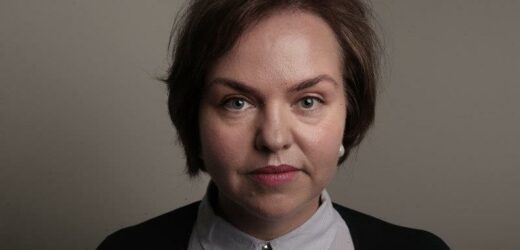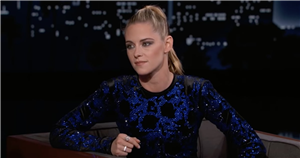Words like patriot aren’t used by progressives anymore. They’ve allowed far-right conspiracy groups to claim them without putting up a fight.
Yet many Coalition MPs were quick to use the term last week to pay tribute to the late Labor senator Kimberley Kitching. It appeared to make many progressives deeply uncomfortable.
Senator Kimberley Kitching – pictured in 2017 – was curious about the world and everything and everyone in it.Credit:Andrew Meares
The dictionary defines a patriot as “one who loves and supports his or her country.” But patriotism has for some time been largely interchangeable with nationalism, which really is something different altogether.
At this point Kitching would want me to pause and explain that the English word patriot derived from the French word “Patriote” in the 15th century. And that the French word originated directly from the Latin “Patriota”, meaning “fellow-countryman”.
She loved language. She spoke six of them, including French and Latin. And loved learning of the etymology of written words.
If you had the fortune to know Kitching personally you will be forever blessed. She was a warm, caring, happy, intelligent woman who was full of optimism and positivity. She was curious about the world and everything and everyone in it.
She judged you on how you treated her and not by what you thought about something or what political party you voted for or the media organisation you represented.
In the days since the news broke of her death, I’ve been re-reading years’ worth of WhatsApp exchanges – perhaps in the foolish hope she might be online again so I can update her about what I saw today in London, like a statue I walked past or a blue plaque marking a historical event or a famous person’s home.
There are messages from her about the wonder she found in the outdoors, with verses from The Garden by Andrew Marvell, which she’d first read in an anthology of poems about nature that her father gave her as a child.
“I remember when I first read it as a very young person, understanding how sometimes light looks green under a tree,” she wrote. “I love that – it makes me happy.”
There’s another typically excitable one about a new phone app she’d downloaded which, when pointed at the night sky, would tell you what stars were above you.
“There are two moons in October 2020,” she wrote. “The Harvest moon last night and then on Hallowe’en is a Blue moon (as in ‘once in a blue moon’ because they only happen every few years) is that not the coolest thing?!”
I remember when her cavoodle, Ronnie, died and a phone conversation turned into a sob fest. She was so upset and I felt so hopeless that I couldn’t console her. She texted later about the love one can find in a dog.
“They’re so accepting of us,” she wrote. “It’s always good to share love – makes it much greater I think. Sometimes I would just look at Ronnie and he would look at me. And there’s a peace.”
Senator Kitching with her dogs Ronnie and Nancy-Jane in 2018.Credit:Kristoffer Paulsen
She spoke a lot about love. Love for her family, her friends and their dogs. She always asked about my daughter. She always remembered the names of everyone’s children.
While the small and simple things in life brought her a never-ending sense of joy and amazement, the big issues in life weighed heavily on her shoulders.
Politics is transactional. Everyone uses each other to get ahead: politicians, their staff and journalists. The majority keep it professional but, despite imposing barriers, friendships can inevitably form. Kitching was so personable that it was easy to be drawn to her. She was great company. I proudly called her a friend. But she never asked me for anything other than to chat about life and the world, most often over a steak sandwich at Aussies cafe in Parliament House on a Thursday lunchtime but occasionally with other MPs and journalists in the evening.
Much has been written about her deep interest in national security and foreign affairs and her efforts to convince her colleagues of the merits of the Magnitsky Act, which allows the government to sanction individuals linked to human rights abusing regimes around the world.
Her views towards the Chinese Communist Party are also well known, along with her championing of the oppressed Uighur and Tibetan people. Her death has been publicly mourned by the Dalai Lama.
But less has been written about her deep concern for the way the West – and in particular Australia – withdrew from Afghanistan and the people it left behind.
In January this year the Senate Foreign Affairs, Defence and Trade References Committee, which Kitching chaired, released a scathing consensus report into Australia’s engagement in the Middle East, accusing the government of being “dishonourable” in its efforts to support those, particularly interpreters, who had helped troops in their near 20-year mission.
The fact it was a consensus report was hugely important to her. The committee brought together a diverse group of senators – from Liberal Eric Abetz, Green Janet Rice and Jacqui Lambie.
“I’m so glad,” she texted. “I wanted to have a report that looked deep as well as practically. I didn’t want it to be partisan. I wanted it to reflect who we say we are, and point out that we should behave well and in accordance with our mateship and loyalty values.”
In particular, she was incredibly proud of a passage of the report written by her which she said has made the government senators “nervous” but “they couldn’t disagree with”.
To Kitching, the key to being a patriot was sticking to the Australian ethos of loyalty to mates. She said Australian politicians needed to keep true to that ideal.
“The question of how we treated those who risked all to help us in Afghanistan relates to who we are as Australians and what we value,” she wrote. “We asked these people to stand in harm’s way with Australian personnel. We have left them standing in harm’s way.”
And yet, as the report spells out, she was a partisan. Just because she made friendships across the divide, it didn’t mean she wasn’t committed to the Labor cause. She won her political rivals over with principles and the power of persuasion.
She wanted Australia to be a big-hearted nation that never squibbed it on the world stage when it came to the big calls on protecting freedom and democracy.
Kitching’s colleagues hated the fact she fraternised with the enemy. Her weeks in Canberra were filled with late-night drinks with cabinet ministers and heads of intelligence and security agencies. It enraged her more senior colleagues who rarely had the same access.
Over the course of three days in September last year, she used those relationships to personally advocate and negotiate to get more than 30 Afghans out of Kabul and onto Australian rescue planes and to safety. She and her loyal staff worked through the night – communicating directly with those on the ground and then dealing with government ministers.
Just weeks prior to her death she also helped two people flee Russia.
Yet Kitching died feeling incredibly disrespected by the powerful men and women of her party.
Labor’s leadership was not discreet in offering their views on her to others. In recent times she had been treated appallingly, with relations plunging to new depths last month when she used parliamentary privilege to name the Chinese billionaire Chau Chak Wing as “the puppeteer” mentioned in ASIO boss Mike Burgess’s case study of an alleged foreign interference plot. Chau denies this.
Her colleagues hit the roof. Seemingly because it made them look bad. It led to unattributed comments in news reports which basically amounted to threats on her job.
While Labor leader Anthony Albanese spent days essentially denying the story by hiding behind ASIO’s carefully worded statements, it was Kitching who had the courage to name the wealthy Chinese businessman despite the backlash it would cause.
She thought protecting Australia’s democracy was more important than making the party look bad or making senior figures feel uncomfortable.
Kitching was no paragon. She played her politics hard and shouldn’t be remembered as a victim.
But she loved and believed in the potential of Australia and all Australians. She was a patriot in the true sense of the word.
And that should never be deemed a bad thing.
Most Viewed in Politics
From our partners
Source: Read Full Article




